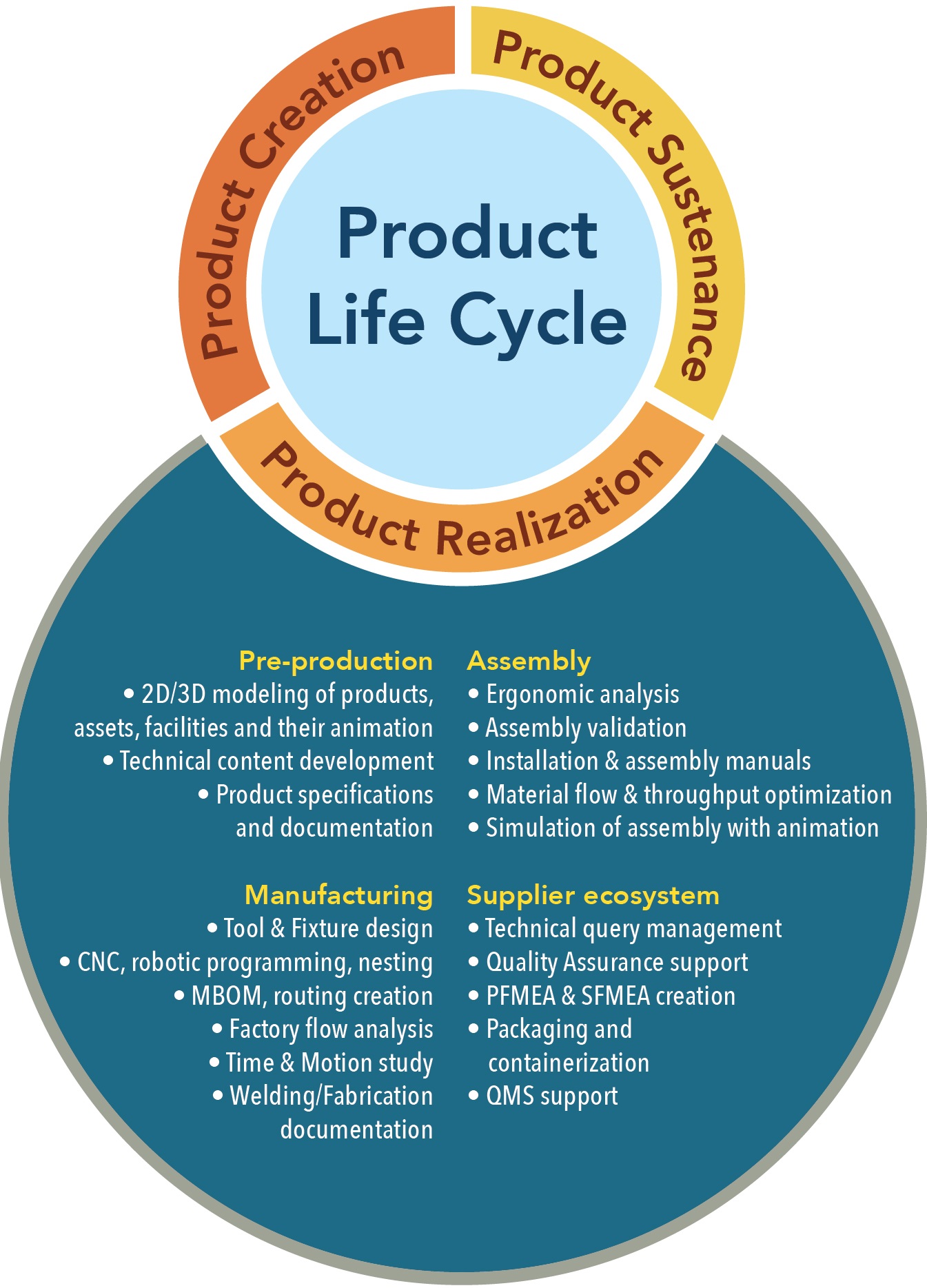Industry 4.0-as-a-service for digital manufacturing
Industry 4.0 is the fourth industrial revolution after the earlier waves which were mechanization with steam, mass production with electricity and automation through computers. It is also referred to as ‘smart manufacturing’ and ‘connected factory’. Industry 4.0 has received a lot of attention recently beyond the CIO’s office. CXOs, political and business leaders are aware of it, due to the business benefits it promises to deliver.
The four broad tenets of Industry 4.0 are:
1. Interoperability of connected equipment. People, products and processes to talk to each other, enabled by Internet of Things
2. Informed decision making with the data gathered, and leveraging analytics
3. Autonomous decision making at the edge, with preset rules and sensors
4. A digital twin or a virtual copy of the physical world. The ‘digital twin’ for the entire manufacturing facility can be modelled and its day-to-day operations simulated to provide what we call Industry 4.0-as-a-service.
The above concepts by themselves are not entirely new but each system has its own siloed communication protocol and language for operation and communication. Emerging technology waves such as the Industrial Internet of Things and Industry 4.0 are promoting the element of interoperability with global standards and enabling individual components to seamlessly talk to each other.
Consortiums have been formed among industry players and solution providers to promote such standards. These technologies are becoming affordable with the availability of skilled resources and receding prices of computing elements such as hardware and software, especially with XaaS type of deployment models. The flow of information becomes the common thread, providing cross-functional visibility across the enterprise from the shop floor to the top management. This enables real-time rational fact based decision-making.
If the life cycle of a product can be split into three broad elements as shown below, industry 4.0-as-a-service covers the “product realization” phase where physical products are manufactured on the shop floor and assembled. The list of activities shown is not exhaustive and can vary from industry to industry. It depends on a specific firm’s internal processes. Commercially available software is used for these activities, resulting in minimal coding – with some configuration and customization based on the need.
Product creation is usually handled by the engineering department for new product introduction and enhancements to existing products. Product sustenance covers the aftermarket phase from shipment to performance, maintenance, warranty management and end-of-life.
We have been offering Industry 4.0-as-a-service for a key client. Multiple factories are supported by a central team for pre-production, planning and digitized execution of machining, assembly, tool design, fabrication and welding operations. The scope of work covers 30 niche sub-competencies. It is driven by metric based execution, achieving economies of scale for cost efficiencies, performing standardized, repeatable work packages and achieving 15% year-over-year productivity.
There are many benefits that can come out Industry 4.0 and its implementation. Developing countries, especially the SME sector, can leapfrog earlier waves of technology that were missed - such as robots and automation, which developed countries went through. The following are the highlights of Industry 4.0-as-a-service.
- Optimized factories - The layout of green field projects can be optimized for space utilization and material flow by depicting them virtually even before a brick is laid. Costly mistakes in long-term investment decisions can be avoided.
- Productivity – The flow of materials, personnel, tools and other material handling equipment can be virtually modelled for minimal movement. Routings of sub-assemblies and the finished products can be planned in advance. A what-if type of scenario analysis can be conducted to ensure a smooth operation. Bottlenecks in operations can be identified and improved for better material flow. Time and motion studies can be conducted for efficiency and cycle time reduction. Industry 4.0-as-a-service implementation can lead to a 15 to 25% improvement in productivity depending on the implementation.
- Cost savings – Usage of valuable resources from human effort to raw materials, energy, tools and consumables can be monitored and minimized for cost savings. A 15 to 25% in reduction in conversion cost can be achieved depending on the industry.
- Quality assurance – First-time-right metrics can be improved for new setups, tooling and operations by conducting a virtual dry-run before the actual operation.
- Transparency and informed decision making – Analytics based insights with visualization and real time status updates will lead to fact-based timely decisions. Audit-readiness and traceability will improve with historical operations information.
- Employee health and safety – Ergonomics or the human-machine interaction can be simulated removing hazardous situations. This can lead to a reduction of 90% in the number of near-misses and mishaps. Faster response times can be achieved during emergencies.
There are multiple challenges faced by organizations in implementing Industry 4.0. It is not one single technology. It consists of multiple areas such as automation, control systems, system simulation, analytics etc. There are subject matter experts available in these individual areas but what is vital is the expertise to look at the big picture, stitch the individual components together and implement a comprehensive solution that achieves the business objective. While some organizations have implemented pilots, scaling up across their network of factories is a challenge.
Given the complexity of implementation, especially with multiple diverse hardware and software components involved, finding the right partner(s) for design and implementation is also a challenge. A system integrator can play the role of an overall coordinator for Industry 4.0 design, roadmaps, blueprints, implementation and its ongoing management.
- By S Ramachandran, Principal Consultant - Manufacturing, Infosys BPO
The thoughts and opinions shared here are of the author.
Check out our end of season subscription discounts with a Moneycontrol pro subscription absolutely free. Use code EOSO2021. Click here for details.

